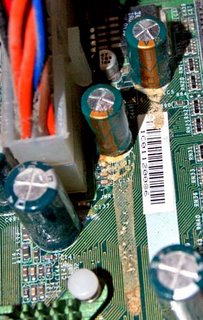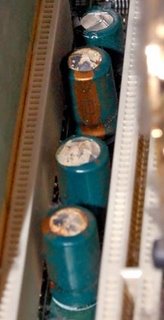A close physical examination of the motherboard revealed that many of the capacitors were leaking their contents, either through the top of the capacitor, or at the base plug.
 I took a few pictures of these capacitors to show what this leaking looks like. The first picture shows a couple of capacitors that have leaked through the base plug and their contents have spilled onto the motherboard. As the motherboard is in a vertical orientation in the PC case the contents of the capacitor in the left of the picture ran downwards and the track of dried-out material can be clearly seen. A bulge in the top of the two leaking capacitors, due to pressure build-up, can also be seen - a tell-tale sign of a potential leaker.
I took a few pictures of these capacitors to show what this leaking looks like. The first picture shows a couple of capacitors that have leaked through the base plug and their contents have spilled onto the motherboard. As the motherboard is in a vertical orientation in the PC case the contents of the capacitor in the left of the picture ran downwards and the track of dried-out material can be clearly seen. A bulge in the top of the two leaking capacitors, due to pressure build-up, can also be seen - a tell-tale sign of a potential leaker.The second picture shows three capacitors that have leaked through the top where the contents have burst through the cap. The rear-most capacitor in this shot is a different brand of capacitor and is not a leaker. In total, ten capacitors on the motherboard were found to be leaking and all were from the same manufacturer and the same capacitance value.
As capacitors are used to regulate voltage in various sections of the motherboard, failure of capacitors can cause many problems that could be interpreted as power supply, memory or hard drive issues.
 This was only the second time in the past twelve months that we came across this problem. The cause of the problem has an interesting background, involving a case of industrial espionage that went wrong. Essentially, the faulty capacitors have an incorrect electrolyte formulation, which leads to hydrogen gas being produced. The build-up of gas causes the pressure increase which eventually ruptures the capacitor.
This was only the second time in the past twelve months that we came across this problem. The cause of the problem has an interesting background, involving a case of industrial espionage that went wrong. Essentially, the faulty capacitors have an incorrect electrolyte formulation, which leads to hydrogen gas being produced. The build-up of gas causes the pressure increase which eventually ruptures the capacitor.See further pictures at PCStats and more info at Geeks.com.
No comments:
Post a Comment